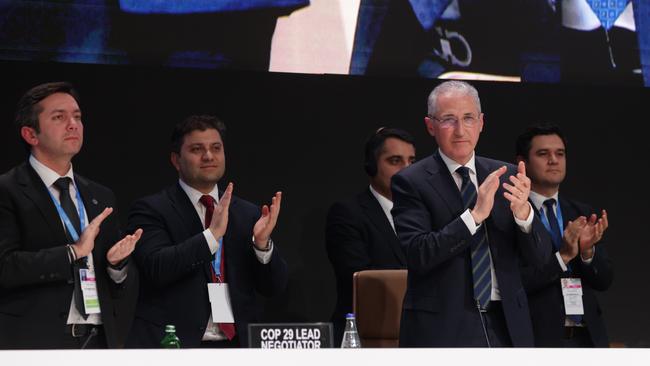COP29 agrees on $460bn annual funding deal to help poorer nations
US and other wealthy countries agree to triple their annual climate financing by 2035, but incoming administration is expected to repudiate deal

The US, Europe and a handful of other rich countries agreed to triple the financing they provide for climate-change projects in the developing world to at least $US300bn ($460bn) a year by 2035, signalling their commitment to the Paris climate accord, despite a looming obstacle: the incoming presidency of Donald Trump.
The Trump campaign pledged to pull the US out of the Paris agreement, and his administration along with the Republican-controlled House of Representatives and Senate are likely to cut US climate financing over the next few years, fuelling doubts about America’s ability to fulfil the Baku agreement, at least in the near term.
That puts pressure on Europe to help fill the hole left by the US. That is a tall order for countries that are seeing their budgets squeezed by spending to arm Ukraine and rebuild their militaries against the threat from Russia.
Wealthier members of the developing-country bloc – China, the oil-rich Persian Gulf states and a handful of others -- agreed to limited steps that could help pick up the slack. The final agreement notes the “voluntary intention” by developing countries to allow their share of climate financing provided by the World Bank and other multilateral development banks of which they are shareholders to count towards the new financing goal.
Developing countries didn’t object to the agreement before it was adopted in the cavernous conference centre in Baku, but expressed outrage shortly afterwards. They were looking for an annual financing goal in excess of $US1 trillion a year by 2030.
“We are disappointed with the outcome, which clearly brings out the unwillingness of developed country parties to live up to their responsibilities,” said Leena Nandan, state secretary of India’s environment ministry.
“India does not accept the goal proposal in its present form ... The goal is too little, it is too distant. It is 2035, too far gone.”
Still, wealthier members of the developing-country bloc rebuffed demands from Western countries to commit to provide climate funds to poorer countries. That would have blurred the categories of developed and developing set out in the first UN climate treaty of 1992, a divide Western nations have said no longer makes sense.
That treaty and the Paris agreement said only that developed countries are required to provide climate financing.
In theory, higher-income developing countries are entitled to receive such funds under the UN climate treaties, but in practice the countries have increasingly been investing in green-energy projects in other developing countries.
China has provided some $US25bn in climate financing to poorer countries since 2016, Chinese officials said.
The world is facing growing costs from extreme weather that scientists have linked to the effects of climate change. This year is likely to be the warmest on record. It is also likely to be the first, according to EU climate scientists, that averaged 1.5C over pre-industrial-era temperatures, a key threshold set out in the Paris Accord. Temperatures have been so high that scientists have been at a loss to explain them, even accounting for the build-up of greenhouse gases in the atmosphere.
Scientists have said the heat over the past year has supercharged destructive weather around the globe, from the powerful hurricanes that have slammed the US to torrential rains in Europe, while exacerbating drought in places such as the Amazon River basin.
The agreement in Baku will cover only a fraction of the cost for poorer countries of adapting to climate change and shifting to clean energy. Officials have said the bill could total trillions of dollars a year after 2030.
Developed countries have struggled to scrape together the funds to meet a previous goal set in 2009: $US100bn a year by 2020. They met it two years late in 2022, sending $US115bn to the developing world. That includes direct government support and private-sector financing that piggybacks on the government investment.
Western countries were lobbying China, Saudi Arabia and other higher-income countries in the developing bloc to help out. China’s carbon dioxide emissions have soared since 1992, and they are now the world’s largest, with a third of the global total.
China’s emissions are so large that its cumulative emissions since the dawn of the industrial era now exceed those of the 27 nations of the EU.
Negotiators faced a sharp disagreement over the size of the new financing goal in the final hours of the talks. The US, Europe and other developed nations proposed $US300bn in annual financing to flow by 2035. The nations of the developing bloc were demanding $US500bn.
The Trump presidency loomed in the background of the talks. That put pressure on negotiators to hammer out a deal while diplomats of the Biden administration were on the scene.
US officials said they wanted to reach a deal that even if it were repudiated by Mr Trump, could be accepted by a future Democratic administration likely to want to rejoin the Paris agreement.
UK Energy Secretary Ed Miliband welcomed the deal as “a critical eleventh-hour deal at the eleventh hour for the climate”.
“It is not everything we or others wanted but is a step forward for us all,” Mr Miliband said in a statement released shortly after the deal was announced.
“If this finance is used in the right way, it could cut the equivalent emissions of one billion cars and could protect nearly a billion people from the impacts of climate change,” he said.
The Wall Street Journal



To join the conversation, please log in. Don't have an account? Register
Join the conversation, you are commenting as Logout